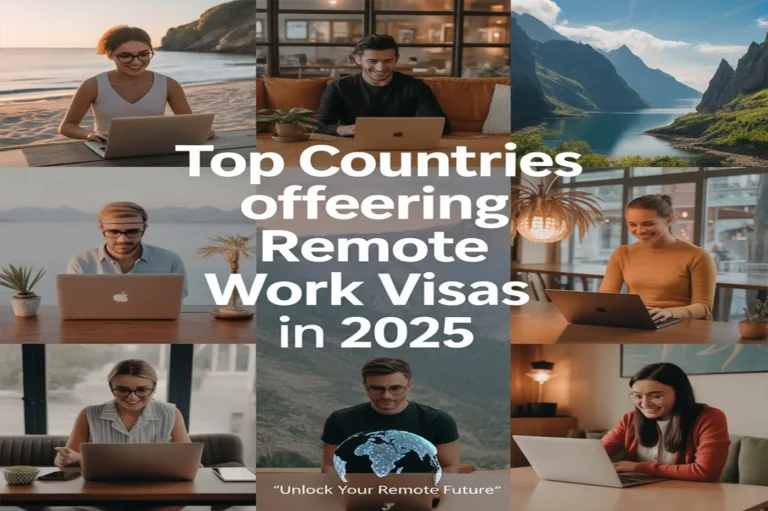Relocating abroad for work is one of the biggest career moves you can make and one of the most rewarding. From increasing your earning potential to gaining international experience, working in another country can change your life and future career prospects.
But here’s the reality, moving abroad legally is not just about buying a plane ticket. There are visas to apply for, taxes to plan, relocation costs to cover, cultural differences to adapt to, and legal compliance to maintain.
This detailed guide breaks down exactly how to relocate abroad for work, step by step, with real examples, smart tips, and clear checklists so you can avoid legal pitfalls and thrive in your new home.
Why It’s Worth Doing It the Right Way
Many professionals have made costly mistakes trying to cut corners:
- Working on a tourist visa, only to get deported or banned.
- Not understanding local tax rules, leading to big fines.
- Overlooking residency registration, resulting in losing legal status.
When you relocate the right way:
- Your rights are protected under local labor laws.
- You can access public services like healthcare and education.
- You build a clean immigration history, making future visas and citizenship applications easier.
- You avoid stress and can focus on what matters: succeeding in your new role and enjoying your host country.
What You’ll Learn in This Guide
This comprehensive guide covers:
- How to choose a country and work visa that fits your goals.
- How to find a legal job offer.
- What paperwork you’ll need and how to get it approved.
- How to plan your move, housing, finances, shipping, and more.
- How to register properly when you arrive.
- Practical examples, resources, and pro tips throughout.
Step 1: Choose the Right Country for Your Career Goals
Understand Where Your Skills Are Needed
Different countries have different labor shortages. Research which nations actively seek talent in your field.
Examples:
- Germany: High demand for engineers, IT professionals, healthcare workers.
- Canada: In-demand jobs include tech, construction trades, and healthcare.
- Australia: Skilled trades, nursing, and STEM fields are strongly supported by visa programs.
- Singapore: Financial services, biotech, and digital marketing professionals are highly valued.
How to check
- Look up the country’s official “in-demand occupations” or “skilled migration list.”
- Use the government’s immigration website as your primary source, not random forums.
Don’t just pick a country for lifestyle, check salary scales, cost of living, and long-term career opportunities.
Step 2: Research the Right Visa Type
Most countries have at least three main visa routes for working legally:
Visa Type | Good For | Example Countries |
Employer-Sponsored Work Visa | Moving for a specific job offer. | UK Skilled Worker Visa, Canada Temporary Foreign Worker Program, US H-1B. |
Intra-Company Transfer Visa | Working for your current company’s overseas branch. | EU ICT Permit, L-1 Visa (US). |
Self-Employed or Remote Worker Visa | If you freelance or work for a foreign employer. | Spain Digital Nomad Visa, Portugal D7 or Digital Nomad Visa, Barbados Welcome Stamp. |
Key takeaway: Each visa has strict eligibility rules: salary thresholds, job type, qualifications, and sometimes language requirements. Always read the official requirements, never rely on outdated blog posts.
Step 3: Find and Secure a Job Offer (If Needed)
In most cases, you can’t get a work visa without a confirmed job offer. Here’s how to increase your chances:
1. Update Your Resume for International Roles
- Use clear, concise English.
- Match local resume style (e.g., UK prefers 2 pages; US often 1 page).
- Highlight skills and certifications relevant globally.
2. Apply on Trusted Platforms
- LinkedIn Jobs, Glassdoor, Indeed, and country-specific sites (e.g., Seek in Australia, JobBank in Canada).
- Use your industry’s professional networks.
3. Leverage International Recruiters
Many global recruitment agencies specialize in matching companies with foreign talent. Examples:
- Robert Walters (global)
- Hays (UK, Europe, Asia)
- Michael Page (worldwide)
Join LinkedIn groups for expats or job seekers in your target country. Many job leads are shared privately.
Step 4: Gather All Required Documents
Visa applications often require extensive paperwork. Typical documents include:
- Valid passport (at least 6 months validity remaining).
- Job offer letter or employment contract.
- Proof of qualifications (degrees, certificates).
- Professional license (if applicable, e.g., nursing, teaching).
- Criminal background check (often called a police clearance certificate).
- Medical exam results (for certain countries).
- Proof of sufficient funds or salary to support yourself.
Step 5: Apply for Your Work Visa
Follow these best practices:
- Apply through the official government portal or embassy.
- Double-check fees and deadlines, some visas have limited quotas per year.
- Be honest and consistent in your paperwork, false info can lead to bans.
- Schedule biometrics appointments if required (fingerprints, photo).
- Wait for approval before resigning from your current job or booking flights.
Note that many employers help with visa applications or even cover costs, negotiate this as part of your job offer.
Step 6: Make a Financial Plan
Relocating can be expensive. Plan for:
- Visa fees and legal costs.
- Initial flights.
- Temporary accommodation when you arrive.
- Deposit for rental housing (often 1–3 months’ rent upfront).
- International health insurance (mandatory in many countries).
- Shipping your belongings.
Have at least 3–6 months of living expenses saved. Unexpected delays happen.
Step 7: Arrange Housing and Moving Logistics
Finding a Place to Live
- Many expats start with temporary housing (Airbnb, serviced apartments).
- Use trusted local rental websites, beware of rental scams.
- If your employer offers relocation assistance, use it.
Moving Your Belongings
- Compare shipping companies, get quotes.
- Decide what to ship, sell, or store.
- Check customs rules: many countries restrict food, plants, or certain electronics.
Bringing Pets
- Research quarantine rules and import permits.
- Book vet appointments for vaccines and health certificates.
- Airlines have specific pet transport rules.
Step 8: Prepare for Life in a New Country
Legal Registration
After arrival, you may need to:
- Register your address with local authorities.
- Apply for a local ID or tax number.
- Enroll in local healthcare or insurance.
- Open a local bank account.
Example:
In Germany, all residents must register at the town hall (Anmeldung) within 14 days of moving in.
Adapt to the Culture
- Learn basic phrases in the local language.
- Research local customs and workplace etiquette.
- Join expat groups on Facebook, Meetup, or InterNations.
Step 9: Know Your Rights and Responsibilities
Understand:
- Your rights as a foreign worker: working hours, vacation, notice period, severance.
- Local tax rules: will your employer deduct taxes automatically?
- Whether you need to file taxes in your home country (some countries have double taxation agreements).
Consult an expat tax advisor if you’re unsure. Mistakes can be costly.
Step 10: Maintain Legal Status
Once you’re settled:
- Renew your work permit before it expires.
- Report any changes (new job, address change) to immigration.
- Keep your passport valid.
- If you plan to stay long-term, research permanent residency or citizenship pathways.
Common Mistakes to Avoid
- Working on a tourist visa is a quick way to get banned.
- Don’t trust unverified visa agents, always use official channels.
- Don’t ignore cultural differences, some behaviors legal at home can be serious offenses abroad.
- Don’t missing deadlines for renewals, your legal status can lapse.
- Do not forget to plan taxes, some expats face surprise bills from their home country.
Final Tips
Relocating abroad legally requires planning, patience, and paperwork, but the reward is a life-changing career adventure. Use this guide as your roadmap and check off each step as you go.
With the right preparation, your move abroad can be safe, legal, and a huge success.




Please I’m interested to be abroad